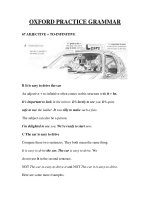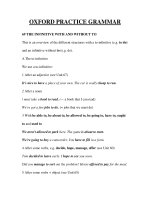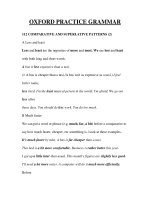Tài liệu OXFORD PRACTICE GRAMMAR 112 pdf
Bạn đang xem bản rút gọn của tài liệu. Xem và tải ngay bản đầy đủ của tài liệu tại đây (86.15 KB, 6 trang )
OXFORD PRACTICE GRAMMAR
112 COMPARATIVE AND SUPERLATIVE PATTERNS (2)
A Less and least
Less and least are the opposites of more and most. We use less and least
with both long and short words.
A bus is less expensive than a taxi.
(= A bus is cheaper than a taxi./A bus isn't as expensive as a taxi.) I feel
better today,
less tired. I'm the least musical person in the world, I'm afraid. We go out
less often
these days. You should do less work. You do too much.
B Much faster
We can put a word or phrase (e.g. much, far, a bit) before a comparative to
say how much faster, cheaper, etc something is. Look at these examples.
It's much faster by tube. A bus is far cheaper than a taxi.
This bed is a bit more comfortable. Business is rather better this year.
I got up a little later than usual. This month's figures are slightly less good.
I'll need a lot more water. A computer will do it much more efficiently.
Before
a comparative we can use much, a lot, far; rather; slightly, a bit, a little.
We can also use no and any. No has a negative meaning.
Your second throw at the basket was no nearer than your first.
We can use any in negatives and questions and with if.
Your second throw wasn't any nearer than your first.
Are you sleeping any better since you've been taking the pills?
If we leave any later than seven, we'll get caught in the rush hour.
C Faster and faster
We use expressions like faster and faster and more and more expensive
to say that something is increasing all the time.
The caravan was rolling faster and faster down the hill.
The queue was getting longer and longer.
Prices go up and up. Everything gets more and more expensive.
The crowd are becoming more and more excited.
The country is rapidly losing its workers, as more and more people are
emigrating.
The form depends on whether the comparative is with er (e.g. louder) or
with more (e.g. more expensive
(see Unit 110B).
We can also use less and less for something decreasing.
As each new problem arose, we felt less and less enthusiastic.
D The faster, the better
We use this pattern to say that a change in one thing goes with a change in
another. Look at these example-
There's no time to lose. The faster you drive, the better. The higher the
price, the more reliable the
product.
The more the customer complained, the ruder and more unpleasant the
manager became.
The sooner we leave, the sooner we'll get there. Are you looking for a cheap
holiday? ~ Yes,
the cheaper the better.
112 EXERCISES
1 Less (A)
Complete the sentences. Use less with these words: attractive, busy,
convenient,
nervous, optimistic, painful, seriously
► Laura once hated flying, but now she feels less nervous about it.
1 David says his leg really hurt at first, but now it's
.................................................
2 Mark and Sarah normally have lots to do, but
they're……………………………. this week.
3 Rita's old flat was near the shops. Her new place is
.......................................... for shopping.
4 Claire used to think Henry was very handsome, but now she finds
him…………………….
5 Matthew is always exercising. Maybe he should take his
fitness…………………….
6 With United's best player injured, Tom feels …………………………...
about their chances.
2 Much faster (B)
Decide what to say. Use a phrase like a bit better or a lot colder.
► You were feeling unwell earlier. Say that you feel better now. A bit,
anyway.
1 feel a bit better now.
1 Mention that yesterday was colder than today. A lot colder, in fact.
2 Say that your coat is longer than is fashionable. A bit, anyway.
3 You left work earlier than usual this afternoon. Slightly, anyway. Tell your
friend.
4 Say that the shop is more expensive than the supermarket. Much more.
5 Ask if the new machine is reliable - any more so than the old one.
3 Faster and faster (C)
Vicky works very hard at her studies, but she's worried that she's making no
progress.
Complete her sentences.
? This subject gets harder and harder (hard) all the time.
? I'm just getting more and more confused (confused).
1 It's becoming ……………………………………………… (difficult) for
me to keep up.
2 The textbook just gets………………………………………………..
(complicated).
3 I spend .............................................................. (more) time on my work.
4 My list of things to do gets ...........................................………………….
(long).
5 My problems are just getting...................…………………………………. .
(bad).
4 The faster, the better (D)
Complete each sentence using the information in brackets.
? (The rent is high.) The bigger a flat is, the higher the rent is.
? (You learn quickly.) The younger you are, the more quickly you learn.









